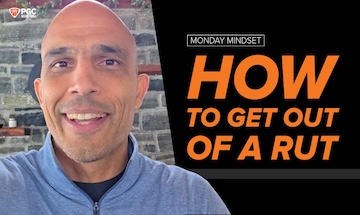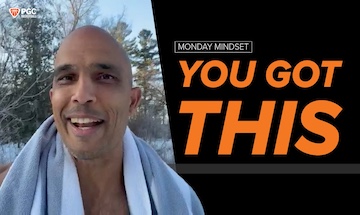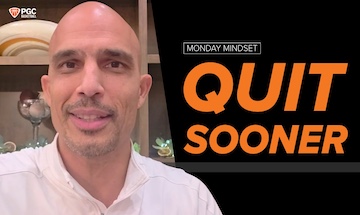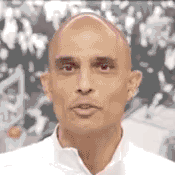3 Biggest Mistakes Basketball Parents Make
We recently caught up with one of our top PGC Basketball Summer Camp Directors, Dustin Aubert, to check in with him on the biggest mistakes basketball parents make. Let’s jump right in…
Mano Watsa: So Dustin, we’ve got a lot of important pressing questions on parents’ minds these days when it comes to helping their kids so why don’t we just start right off with the big one… what are three of the biggest mistakes you’re seeing basketball parents make right now?
Dustin Aubert: Yeah, great question. So first, I think the biggest mistake parents make first is they don’t run their own race with their kids, meaning they’re so gung-ho on comparing their kids to other kids in the area that they want the exact same thing. What’s unfortunate is the way you create the best 20-year-old basketball player is not the way you create the best 15-year-old basketball player, which is also not the way you create the best 10-year-old basketball player. So many parents will see Jimmy, who’s 18 and just got his first D1 scholarship and think, okay, my son is 10. I’m going to have him do the exact same thing every single day that Jimmy does as an 18-year-old and he’ll become a D1 player. It’s not how it works. Basically, this player that you see that is getting scholarship offers and doing all these things has had a blueprint that they followed since they were pretty young. So first and foremost is one, run your own race. That’s the biggest one. Do everything in your power to obviously support your kid, but don’t try to carbon copy what other people have done, who have been successful. It doesn’t work at different stages of development.
Mano Watsa: So true. I think that’ll really help a lot of parents who struggle with comparison. We talk about that all the time, how comparison is the thief of all joy and I mean, we teach the kids that stuff at camp, but the parents got to realize it too.
Dustin Aubert: Yeah, a hundred percent.
Mano Watsa: Okay, moving right along, what would you say is number two?
Dustin Aubert: Yeah, number two is parents and kids are so caught up in results, but the day you plant the seed is not the day you bear the fruit. Meaning, you gotta be patient with this thing. That’s why so many people fail at anything because they want it instantly. Nowadays, they say, don’t give me the book, give me the article… don’t give me the article… give me the tweet… don’t give me the tweet… give me the emoji. Everyone wants to make everything easier but the thing is, you can’t fast track development. It’s the hardest thing in the world, especially basketball development where you’re trying to become a master shooter, for example. So I think the advice is, your current trajectory is more important than your current results. So even if you’re only averaging seven points a game on your JV team, keep training really, really hard and eventually it will pay off.
Mano Watsa: It’s really interesting to hear you say that because nowadays we see these apps like Headway and Shortform. I don’t know if you’re familiar with these, but it basically takes a book and condenses it down into a 15 minute synopsis. So are you saying that we really shouldn’t be doing these types of things because they create unrealistic expectations in other parts of our lives?
Dustin Aubert: I mean, I think we’re all victims of it, and in a good way. I love audiobooks and an audiobook is a condensed way of me actually sitting down and reading a book. But I think picking and choosing your battles is important. Again, you can’t fast track development in any sport. You have to put not your 10,000 hours in, but you have to do what’s called deliberate practice, which leads me right into my third point.
The biggest mistake is mistaking activity for achievement. Meaning just because you’re in the gym or in the backyard practicing for say three hours, it does not mean you got three hours better. The best ones deliberately improve and deliberately practice. We actually just talked about this on our last small group mentorship call with the players.
It comes down to two things. One is having a specific idea of what you want to improve while you’re in the gym. And then number two is making sure there’s a system in place where it’s try it, get feedback, try it again, fail. And so you have to do a version of that. If you’re just in there shooting half court shots and jacking up fade-aways, you’re obviously not getting better. If you’re doing cross between moves that look cool on Instagram, but there’s no one guarding you or no one giving you feedback, you’re not improving. You’re just wasting your time.
Mano Watsa: At camp we teach players that which gets measured gets improved.
Dustin Aubert: Retweet a hundred percent. And a lot of parents will say, what should I do first? Well, it doesn’t really matter. Just do something and use that blueprint. And sometimes if you don’t have someone to work with, go play against somebody else or go play against the clock. The clock is a really good measure as well. How many shots can you make from this spot in one minute? But that’s a good way to kind of have a benchmark of how you’re doing in a certain amount of time.
Mano Watsa: Nice. And Dustin, what player on the female side of the game and on the male side of the game would you say emulate deliberate practice? Does anyone come to mind who on a daily basis the kids can go follow and try to learn more about their approach?
Dustin Aubert: Yeah, it’s a great question. I mean, when I was younger, I loved basketball. I’ve always really loved the game. It’s an obsession that masquerades as a profession. And so I used to try to go down YouTube rabbit holes all the time, but YouTube wasn’t a thing when I was in high school. But kids today, they have so much access to everything. So number one, you can actually find him talking about it, is Steph Curry. Steph talks about the breathing habits that he does in workouts now, and he says the breath is the most important thing we can control as basketball players and most players don’t utilize it. And so his trainer’s name is Brandon Payne. He’s done a lot of good research on how to use breath to get into the flow state, how to use breath to calm yourself, and then how to use breath to inject energy.
And so that’s deliberately taking a skill everyone overlooks and putting it into practice every day. And then he does the same thing. He tracks all his shooting drills, he tracks all his ball handling stuff. So that’s a good example on the men’s side.
On the women’s side, I would say Caitlyn Clark falls in there as well. What I’ve seen of her recently is she’s trying to work on shooting off the bounce going to her right because she’s really good at shooting off the bounce going to her left, but right there in and of itself, she’s deliberately working on a skill and she can measure that skill against stronger athletic players at the WNBA level.
Mano Watsa: Sounds like some of it has to do with knowing your weaknesses and really putting in the time to work on those weaknesses, which is mentally challenging. That’s hard for a lot of people. We want to work on the things we’re good at.
Dustin Aubert: That’s it. And I think you actually just hit on another golden rule, which is find someone who will be honest with you, and a lot of parents maybe don’t know basketball or they don’t want to be honest with their kid, but that’s when you find a good coach or a good trainer who will say, Hey, this is two things you must get better at it if you do want to play the next level. It’s hard. A lot of kids don’t want to hear that.
To be continued…
In the meantime, view basketball camp locations & dates here.
Committed to your child’s success,
Mano
Related Articles
Monday Mindset: How to Get out of a Rut
A new setting can reset your energy, restore your confidence, and reignite your passion. That’s your Monday Mindset: when you’re in a rut, change your environment and change your state.
Monday Mindset: You Got This
Every morning starts with one hard thing, and one simple reminder: You got this. Whatever challenge is in front of you, speak confidence into it. Push forward. Trust yourself.
Monday Mindset: Quit Sooner
Winners don’t always hang on, they know when to quit sooner.
About PGC
PGC Basketball provides intense, no-nonsense basketball training for players and coaches. Our basketball camps are designed to teach players of all positions to play smart basketball, be coaches on the court, and be leaders in practices, games and in everyday life.
We combine our unique PGC culture with a variety of teaching methods and learning environments to maximize the learning potential of those that attend our sessions. In addition to spending 6-7 hours on the court each day, lessons will be reinforced through classroom sessions and video analysis.
Our goal at PGC is to empower you with the tools to fulfill your basketball dreams, while also assisting you in experiencing the joy of the journey.
To learn more about PGC Basketball, including additional basketball training tips and videos, visit our YouTube Channel or find us on Facebook, Instagram, and Twitter.

















Share This Post